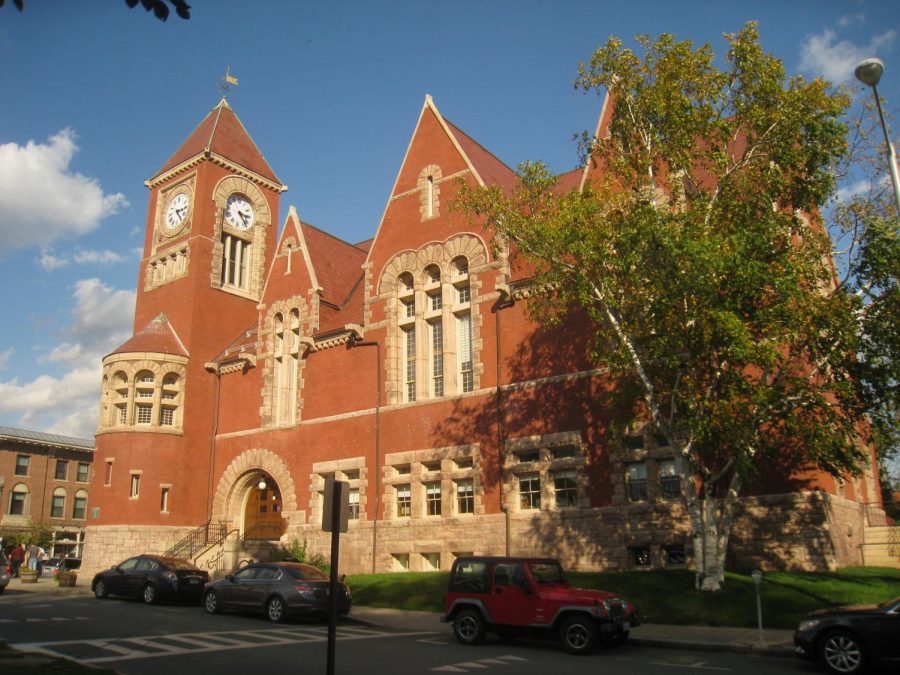A month after Amherst voted to transition to a new form of town government, the plan to facilitate the change is already in the works with elections for new town councils to be held in the fall.
On March 27, 58 percent of voters supported a measure that would do away with the town’s current government set-up, a 240-elected-member Town Meeting and five-member Select Board, in favor of a 13-member town council.
The proposed government will begin to go into effect this fall when Amherst residents vote to elect their new representatives, two from each of the town’s five districts. The remaining three seats will be filled by town-wide votes.
“No government is perfect, and change is hard,” said Andrew Churchill, who chaired the Charter Commission which was tasked in 2016 by a town votewith studying the operations of Amherst’s town government and proposing a possible change.
“We based it on that this is the most popular form of government in the country,” Churchill added.
Members of the commission were divided on the issue when the time came for a decision after 16 months and 65 meetings worth of debate. Its nine members split 5-4 in favor of the proposed town council structure.
Churchill was one of the five members who supported a change in the town charter. He said that under the new system, residents will have “clear, visible representatives, so you know who they are and can hold them accountable.”
Previously, Churchill said, with 240 Town Meeting officials from 10 districts, each Amherst resident had 24 representatives.
“It was very hard to know who actually represented you; there weren’t very competitive elections and with 240 people in a room, it’s very hard to deliberate and have conversations about complicated topics,” he said.
Gerry Weiss, former member of the Charter Commission, was opposed to the charter change and believed that the original charter format was more representative.
“I believe in Town Meeting as the closest way for a government to exercise democracy and representativeness. In that room of [Town Meeting members] every night, there are an average of 170 people of different ethnicities, different economic levels, different abilities, different ages, different values, different experiences in life, different knowledges,” Weiss said. “Thirteen people cannot replicate that diversity.”
“I vehemently disagree with the notion that the people of Amherst or any town will truly be represented in such a form of government,” he added.
The election for members of the new town council is expected to take place on national Election Day, Nov. 6, and will coincide with Massachusetts statewide elections. Churchill said that in future years, Amherst elections will take place on odd years but that the Charter Commission hoped to get the new government on track as soon as possible.
Holding the special election this fall will require the approval of the Massachusetts State Legislature. During last night’s Town Meeting, members were planned to ask for approval, making this request to the legislature.If this process runs on schedule, Churchill said, the new town council will be in place on Dec. 3 of this year.
Some people are already expressing interest in running for those seats, Churchill said, including current Select Board members.
“There’s a number of people who were in town meeting or who were on various boards or committees that know about government and would like to help this next stage of it,” he said, “but there will be some new voices as well.”
Once the new town council is established, Weiss believes they should discuss many of the financial problems in Amherst, like employee health insurance, the four major capital projects — schools, the fire station, the library and public works — and the issue of housing prices dramatically increasing as a result of the student population.
Weiss also thinks the council should explore matters of citizen participation.
“I hope they will begin with a conversation about citizen participation and what their values are about making council meetings an inviting place for people to go and make their interests and values known,” Weiss said, adding that he hopes citizens are heard and that council members respond beyond just saying, “Thank you for your comments.”
Unlike the Town Meeting or Select Board, Amherst’s town manager role will still be present in the new government. Paul Bockelman, the current town manager, will remain under contract, as is written out in the approved change to the charter.
As the town meeting will be concluding, the position of town meeting moderator, currently held by Jim Pistrang, will not continue.
Pistrang’s work in the current government is not done yet, though. He moderated the final town meeting last night.
“We still have a budget that needs to be passed and other articles of the town meetings…that need to come before the government,” Pistrang said. “Until the new council is elected, the current government is the one that votes on budget.”
While the members of the commission supported or opposed the change in the charter, Pistrang avoided providing any opinion on the topic, even after the vote was held. From his position as moderator, he must maintain an unbiased approach in managing the town meeting.
The transition process between the two governments is laid out in the approved charter, but the new system will still take some getting used to for officials and citizens alike, Churchill noted.
“It’ll be a learning process,” Churchill said. When voting, “people will have to figure out what they’re looking for in district councilor.”
Bonnie Chen can be reached at [email protected] and followed on Twitter at @bonnie_chenn. Will Katcher can be reached at [email protected] and followed on Twitter at @will_katcher.




















